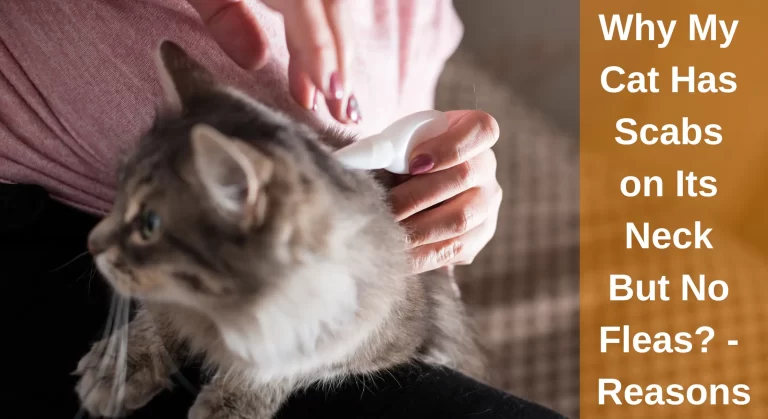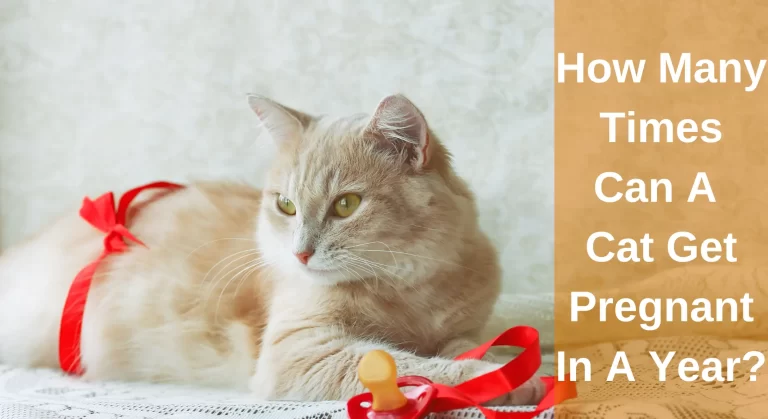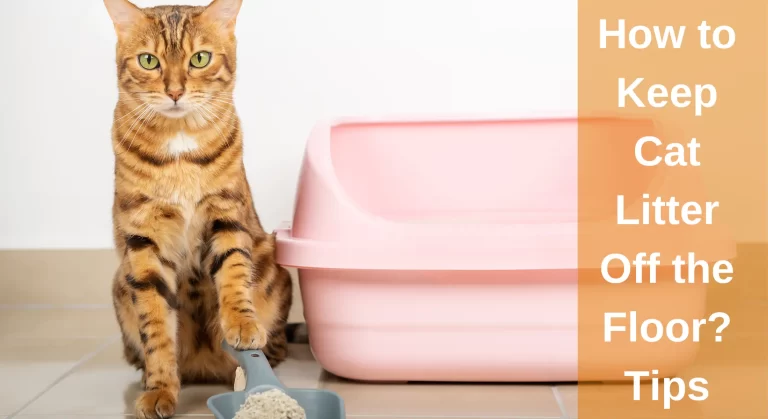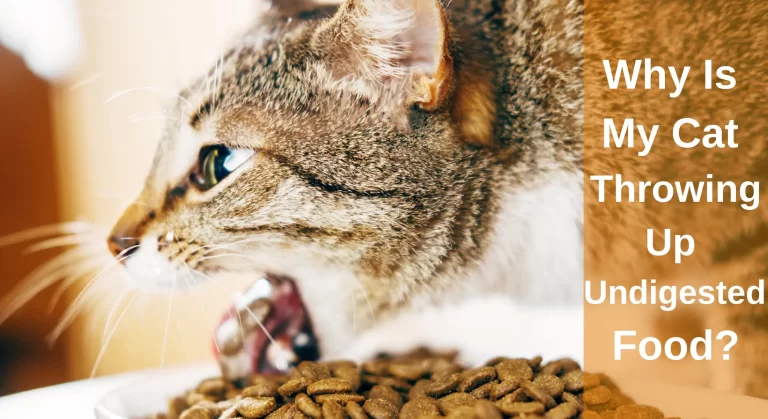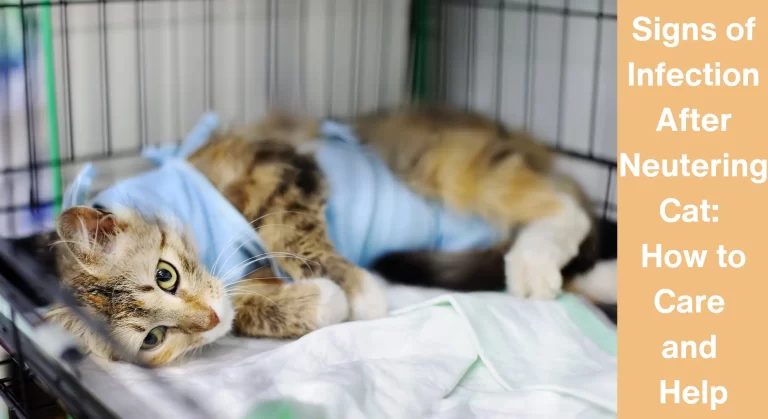How Long After Deworming A Cat Are The Worms Gone? [Answered]
Cats commonly contract worm infections, so it’s crucial to understand the process of deworming and the timeline for eliminating worms after treatment. Given that worms can be spread to you or your other pets, it can be a nuisance. Deworming your pet will solve the problem, but how long should you keep your feline away from your other pets? How Long After Deworming A Cat Are The Worms Gone?
The duration for worms to disappear after deworming a cat can vary depending on the type of worm and the dewormer used. Typically, it takes about 2-3 weeks for the worms to be completely eliminated. Tapeworms can be treated with a single dose and are often gone within 3 days. Roundworms may require two doses spaced apart by 2-3 weeks. Hookworms can take up to 3 weeks to be fully eradicated. If you notice any worms in your cat’s stool after deworming, it’s crucial to consult your veterinarian and provide a stool sample for further analysis. This will help ensure the effectiveness of the deworming treatment.
In this article, we’ll explore the various types of worms that can affect cats, the deworming process, and the factors that determine how long it takes for worms to be eradicated. So, let’s dive in and learn more about the fascinating world of deworming in cats!

How Long After Deworming a Cat Are the Worms Gone?
The time it takes for worms to be completely eradicated after deworming can vary. While some worms may be eliminated within a few days, others may take weeks to disappear entirely.
Generally speaking, cats are worm-free in three days; however, if the infection is severe, it can take up to two to three weeks for your cat’s worms to clear up. The following factors affect how quickly your cat will deworm:
- The Type of Worm: Different types of worms affect cats, such as roundworms, hookworms, tapeworms, and whipworms. Each type has a unique life cycle and responds differently to deworming treatments.
- The Number of Worms:: The severity of the infestation also impacts the duration. Cats with a higher worm burden may require additional rounds of treatment to completely eliminate the parasites.
- Choosing the Right Dewormer: Various deworming medications are available for cats, each with its efficacy and speed of action. The specific dewormer chosen by the veterinarian can influence the elimination time.
- Your Cat’s Health Status: A cat’s overall health plays a role in how quickly it can recover from a worm infestation. Underlying health conditions or a weakened immune system can affect the elimination process.
Factors That Affect the Duration

The Type of Worm
Understanding the type of worm affecting your cat is essential in assessing the time frame for complete elimination. Different worms have distinct life cycles and susceptibilities to deworming medications.
For example, roundworms are commonly found in cats and can be transmitted through infected feces or prey. These worms reproduce rapidly, and their eggs can persist in the environment. Deworming medications targeting roundworms usually require multiple doses to eradicate both the adult worms and the larvae. Your veterinarian will recommend appropriate dewormers for roundworms, along with any necessary follow-up procedures to ensure complete elimination. Often requiring up to 3 weeks or more to be completely eliminated.
On the other hand, tapeworms are transmitted through fleas or by ingesting infected prey. Medications targeting tapeworms generally act quickly, and their effectiveness is often noticeable within a few days(up to 3 days).
The Number of Worms: An Influential Factor
The number of worms present in a cat’s system can influence the duration of elimination. Cats with a heavy worm burden may require multiple deworming treatments spaced over several weeks to ensure complete eradication.
The reproductive capacity of worms can also affect the duration. For instance, some roundworm species lay thousands of eggs daily, increasing the likelihood of re-infestation. Due to their fast reproductive rate, completely eliminating these worms may require more time.
It is advisable to deworm your pet as soon as you observe any signs of infestation, as delaying the treatment can result in a higher number of worms.
Choosing the Right Dewormer: Tailoring Treatment for Optimal Results
The choice of deworming medication used to treat your feline friend will significantly impact the time it takes for the worms to be eliminated. Different dewormers have varying effectiveness and speed of action.
Some dewormers act quickly, killing worms within a day or two. Others require multiple doses or longer treatment courses. Ensuring optimal results necessitates strict adherence to the prescribed dosage and schedule
Praziquantel and epsiprantel, both widely recognized dewormers, have proven efficacy in combating tapeworm infections in cats. Typically, tapeworms can be eradicated within three days of deworming using these medications. In contrast, roundworms require more potent dewormers like Panacur or fenbendazole, often necessitating multiple doses for complete elimination.
It is important to note that a dewormer effective against one type of worm may not be suitable for another. One common error made by cat owners is using a single dewormer for various worm species, neglecting the importance of targeted treatment. This practice can have detrimental effects on the health of their feline companions..
Consult your veterinarian he will prescribe the most suitable dewormer based on the type of worms detected and the severity of the infestation.
Your Cat’s Health Status: An Overarching Influence
The overall health of your cat can affect its ability to eliminate worms efficiently. Cats with compromised immune systems or underlying health conditions may take longer to recover from a worm infestation.
Your veterinarian will evaluate your cat’s health status and recommend a suitable dewormer that can eliminate the parasites within the shortest possible timeframe. However, it is important to acknowledge that treatment times may vary due to the aforementioned factors.
It’s important to provide proper care, a balanced diet, and any necessary additional treatments to support your cat’s health during the deworming process.
Recognizing Signs of Progress After Deworming
- Reduction in worm-related symptoms: One of the clearest signs of progress is a reduction in worm-related symptoms in your cat. Look for improvements in symptoms such as diarrhea, vomiting, weight loss, or a bloated belly. As the worms are eliminated from the cat’s system, these symptoms should gradually diminish.
- Visible worms in feces: After deworming, it is not uncommon to see worms or worm segments in your cat’s feces. This indicates that the deworming treatment is working, as the worms are being expelled from the body. The presence of worms in the feces is a positive sign of progress. It’s important to note that not all types of worms are always visible in the feces. Some worms, such as tapeworms, may shed segments that resemble grains of rice, which can be seen around the anal area or in the litter box.
- Decreased worm eggs in fecal samples: If your veterinarian performs follow-up fecal tests to monitor the efficacy of the deworming treatment, a reduction in the number of worm eggs observed in the fecal samples is a clear indication of progress. It shows that the treatment is effectively reducing the worm population in your cat.
- Improved overall health and appearance: As the worms are eliminated, you may notice improvements in your cat’s overall health and appearance. Their coat may become shinier, their appetite may improve, and their energy levels may increase. These positive changes signify progress in their recovery.
What Are Intestinal Worms? Which Worms Are Treated In Cats?
Intestinal worms are parasites that live off of the nutrition they get from the host’s body. Your cat gets gastrointestinal symptoms, as well as lethargy because everything it eats is taken up by these pesky worms. Given below are the different types of worms that can affect your feline:

Tapeworm
Tapeworms are segmented worms that attach themselves to the walls of your cat’s intestine and grow off of the food your cat eats. They are generally introduced into your pet’s body by ingesting fleas while grooming itself or by exploring the outside world.
While attached to your feline’s intestine, it reproduces by breaking off segments of itself that contain eggs. These segments are passed into the feces, taken up by another animal, and the process repeats itself.
The most common types are Dipylidium caninum and Taenia taeniaeformis. Additionally, a high tapeworm population can result in intestinal obstruction.
Find Out: Should I Quarantine My Cat With Tapeworms
Roundworm
Roundworms are the most common worms to infect cats and can infect cats of all ages. They resemble common garden worms but have a considerably smaller diameter. The two most common types of roundworms are Toxocara cati and Toxascaris leonina.
These worms can also be transmitted to kittens through their mother’s milk since they are free-moving, which also means they do not attach to the gut. They produce small round eggs that are passed into the feces.
Hookworm
Hookworms, like tapeworms, attach to the lining of your pet’s intestine and sucks on its blood. In contrast to tapeworms, these parasites are microscopic and difficult to notice with your bare eyes. Their eggs are also passed into the feces. The most common types are Ancylostoma tubaeforme and Uncinaria stenocephala.
What Are The Symptoms of Worms? How Do I Know If My Cat Has Worms?

It is easy to find out if your cat has worms by noticing the symptoms your cat is exhibiting, which are the following:
- Visible worms in feces or vomit
- Changes in appetite
- Weight loss
- Poor coat condition
- Vomiting or diarrhea
- Bloated abdomen
- Lethargy and weakness
- Visible worms in feces or vomit: One of the most apparent signs of intestinal worms is the presence of worms in your cat’s feces or vomit. These worms may appear as small white or brown threads or as rice-like segments. If you notice any unusual objects resembling worms, it’s a clear indication of a possible worm infestation.
- Changes in appetite: Infected cats may experience changes in their appetite. Some cats may show an increased or voracious appetite, while others may lose their appetite and exhibit decreased interest in food. Any significant changes in your cat’s eating habits should raise suspicion of a potential worm infestation.
- Weight loss: Intestinal worms can cause weight loss in cats. If your cat is losing weight despite having a good appetite or maintaining a healthy diet, it could be a sign that worms are present in their gastrointestinal tract. Sudden or unexplained weight loss should be addressed promptly.
- Poor coat condition: Worm-infested cats may exhibit a dull, unkempt, or unhealthy-looking coat. The presence of worms can deprive the cat of essential nutrients, leading to a decline in the quality of their fur. If you notice a deterioration in your cat’s coat condition, it may be indicative of a worm infestation.
- Vomiting or diarrhea: Cats with intestinal worms may experience episodes of vomiting or diarrhea. The worms can irritate the gastrointestinal lining, causing digestive disturbances. If your cat is regularly vomiting or experiencing diarrhea, it is essential to investigate the underlying cause, including the possibility of worm infestation.
- Bloated abdomen: Some types of worms, such as roundworms, can cause a bloated or distended abdomen in infected cats. If you observe a swollen or rounded appearance in your cat’s abdominal area, it may be a result of a worm infestation. However, it’s important to note that a bloated abdomen can have other causes, so a veterinarian’s evaluation is necessary for an accurate diagnosis.
- Lethargy and weakness: Intestinal worms can sap the energy and vitality of affected cats, leading to lethargy and weakness. If your cat shows a notable decrease in activity levels, seems less interested in play or exercise and appears generally tired or weak, it could be a sign of a worm infestation.
Check Out: My Kitten is Weak And Sleepy – How to Care for a Sick Kitten [A Guide]
How Do Deworming Medications Work?
Deworming medications are anti-parasitic drugs that work in a few ways. Some drugs, such as mebendazole and albendazole, work by preventing worms from absorbing sugars. This starves them to death, and the dead worms pass through the stool.
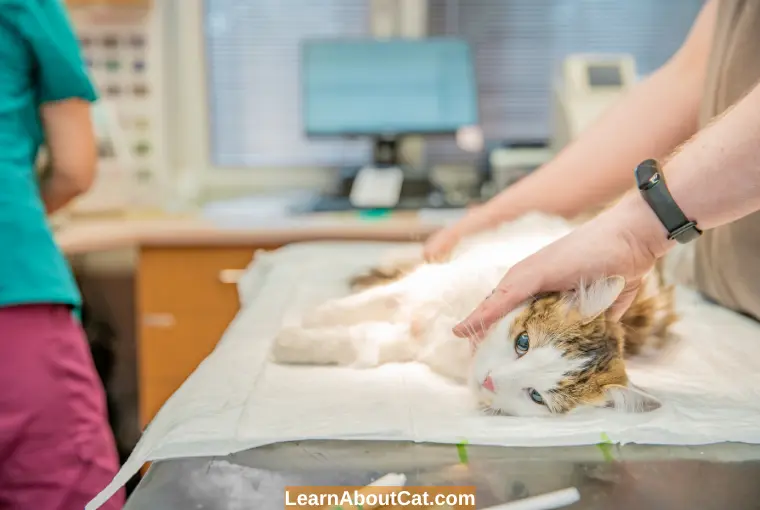
Other drugs like praziquantel and ivermectin work by paralyzing the worms. Their inability to move detaches them from the intestinal wall and allows them to pass out of your feline’s system.
Note: Deworming medicines do not affect eggs, so it is vital to keep everything clean until the infection subsides. Then give a second dose of dewormer two weeks later for extra coverage.
Check Out: Why My Cat Has Scabs on Its Neck But No Fleas?
Does My Cat Still Have Worms After Deworming? How to tell Cat Still has Worms After Deworming
It can be especially difficult to get rid of all your cat’s worms if it has a severe infection, so multiple treatments may be required. The following symptoms will be present if this is the case:

- Vomiting and diarrhea
- Coughing
- Difficulty breathing
- Loss of appetite
- Weakness and lethargy
- Abdominal bloating
- An unkempt and dull coat
- Sudden collapse
Take your cat to the vet if you notice these symptoms a few days after completing the deworming course. Your vet will most probably prescribe a second course of dewormer.
However, do not start the second dose too quickly or give high doses, as dewormers can become toxic to cats and cause symptoms such as ataxia, mydriasis, and seizures. This is why it’s critical to see your veterinarian if the initial deworming treatment was ineffective.
What Are the Side Effects of Dewormers? How Long Do Deworming Side Effects Last?
Like all medications, dewormers have side effects, too, although they are rare in cats. The side effects are primarily gastrointestinal, so your pet will experience vomiting, diarrhea, loss of appetite, or excessive salivation.
- Gastrointestinal Upset: The most common side effect of deworming medications is gastrointestinal upset. Cats may experience symptoms such as vomiting, diarrhea, or soft stools. These side effects are usually mild and temporary. Kittens might also develop abdominal bloating. However, there is nothing to worry about as these unwanted effects only last a couple of days.
- Lethargy: Some cats may exhibit temporary lethargy or reduced activity levels after receiving deworming medication. This is typically a short-term side effect and should resolve within a day or two. However, if the lethargy persists or worsens, it’s important to consult with a veterinarian.
- Appetite Changes: Dewormers can occasionally cause changes in a cat’s appetite. Some cats may experience a temporary decrease in appetite, while others may show an increased appetite. These appetite changes are generally transient and should return to normal within a few days.
- Allergic Reactions: Although rare, allergic reactions to deworming medications can occur. Signs of an allergic reaction may include swelling of the face or limbs, difficulty breathing, itching, or hives. If you notice any of these symptoms, it’s essential to seek immediate veterinary attention.
Duration of Deworming Side Effects
The duration of deworming side effects can vary depending on the individual cat, the specific medication used, and the dose administered. In most cases, mild gastrointestinal upset and lethargy should resolve within a few days. However, if the side effects persist beyond that timeframe or if they are severe, it’s important to consult with a veterinarian for further evaluation.
How Do I Stop Worm Reinfections? Tips to Minimize Risks of Re-infection in Cats
Re-infections are the most annoying part of a worm infection. Dewormers effectively kill worms inside your cat’s intestine. However, eggs and worms in their surroundings are picked up again and swallowed via grooming, causing re-infection.
Reducing re-infection chances is the only way your pet can be truly free from worms. The following are ways to reduce the chances of re-infection:

1. Regular Deworming
Follow a regular deworming schedule as recommended by your veterinarian. This helps prevent the buildup of worms in your cat’s system and reduces the risk of re-infection.
Depending on your cat’s lifestyle and risk factors, your veterinarian can advise on the appropriate frequency and type of deworming medication.
2. Thoroughly Clean Your House
During your cat’s deworming, it will pass dead worms and eggs through its feces. You also might be experiencing diarrhea and vomiting, so your house is bound to be a complete mess.
- You need to clean up accidents as soon as possible and change the litter often, as most re-infections happen through the litter box.
- Wipe surfaces and vacuum carpets where your cat has been, as your feline’s paws can be carrying eggs.
- If you let your cat sleep in your bed, you must also change the bedsheets.
3. Get Rid of Fleas
Fleas are pesky parasites. Not only do they cause itching and scabbing, but they also carry worms. Ingested fleas while grooming will cause re-infection. Therefore, getting rid of any fleas your furry friend has is vital. You can ask your vet to prescribe topical flea medication, then use it in your pet’s coat as prescribed.
You may need to put your cat in an Elizabethan cone, so it does not lick the medicine. A flea comb used once weekly can also help eliminate fleas. Also, keeping your feline inside helps prevent both flea and worm infections.
4. Practice Good Hygiene
Maintain proper hygiene practices to minimize exposure to worm eggs and larvae. Clean your cat’s litter box regularly, as worm eggs can be present in feces. Wash your hands thoroughly after handling your cat, especially before eating or preparing food. These simple hygiene measures help prevent the spread of worms.
5. Maintain a Healthy Diet
A diet that strikes a balance between various nutrients and provides optimal nutrition is a critical factor in supporting your cat’s immune system and overall health. It is imperative to select high-quality cat food that aligns with your cat’s specific nutritional needs. A strong immune system helps fend off worm infestations and reduces the risk of re-infection.
Also Read: How To Get Rid of Fleas in the House?
Can I Use Dewormers As Preventative Treatment?
Dewormers can definitely be used as a preventative treatment. The following is a general guideline of how to administer dewormer to your pet, although you also discuss this with your vet:

Roundworms: Roundworms are common in kittens as they can be passed from their mother’s milk, so you should start deworming your kitten at three weeks and repeat the dosage every two weeks up to the age of eight weeks.
- After eight weeks, you can decrease this frequency to once per month.
- After the age of 6 months, cats only need deworming every one to three months.
For Tapeworms: Kittens cannot get tapeworm infections as they do not groom themselves, and tapeworms cannot pass through their mother’s milk, so cats older than 6 months need to be dewormed every one to three months. It is wise to ask the vet to prescribe a medication that covers both tapeworms and roundworms.
Frequently Asked Questions
Can I speed up the process of eliminating worms after deworming my cat?
While you cannot speed up the process of eliminating worms, This can take anywhere from 3 days to 3 weeks, depending on the type of worm and the dewormer used. But you can ensure that you are following the veterinarian’s instructions correctly. This includes administering the prescribed deworming treatment and any recommended follow-up procedures. Patience is key in allowing the treatment to take effect.
Can cats get worms even if they stay indoors?
Yes, cats can get worms even if they are primarily indoors. Intestinal worms can be transmitted through contaminated soil, contaminated food or water, or through contact with other infected animals. Regular deworming is recommended for both indoor and outdoor cats.
Are all types of worms visible in the cat’s feces?
Not all types of worms are visible in the cat’s feces. Some worms, such as tapeworms, may shed segments that resemble grains of rice in the feces. However, other worms, like hookworms or roundworms, may not be easily visible without a microscope. A veterinarian can perform a fecal examination to detect the presence of these worms.
Can I deworm my cat on my own?
You should go to the vet and get a dewormer prescribed against the specific worm your feline is infected with. Your vet will also guide you with the dose according to your cat’s age, weight, and health conditions.
Can I feed my cat after deworming?
Yes, you can feed your cat after deworming. Make sure your cat is eating and drinking normally after their dose to avoid side effects.
Can I bathe my cat after deworming?
You can bathe your cat after deworming; however, it is important to wait at least 24 hours after deworming before bathing your cat. This will give the dewormer time to work its way through the cat’s system. Also, ensure that any topical deworming products have dried or absorbed properly before bathing.
Do cats poop out worms after being dewormed?
Yes, sometimes cats can poop out dead worms after they have been dewormed. The deworming medication kills the worms inside the cat’s body, but the dead worms don’t disappear completely. Instead, they are eliminated from the cat’s system when they go to the bathroom. So, you might see dead worms in your cat’s poop after deworming.
Conclusion
Worms are a nuisance, but they are relatively common in cats. Deworming is essential for ensuring their long-term health and happiness. Dewormers take three days to work but can take up to three days in case of severe infections.
It is necessary to keep everything clean to prevent re-infection. Consult your vet if you think your feline has worms. They will diagnose the specific worm that has infected your cat, the medication to use against it, and the dose according to your cat’s age and body weight.
Who is Isabella?
My name is Isabella, and I am a dedicated and knowledgeable cat enthusiast. With years of experience caring for cats and a deep love for felines, I made a mission to help other cat lovers navigate the challenges of cat ownership.

